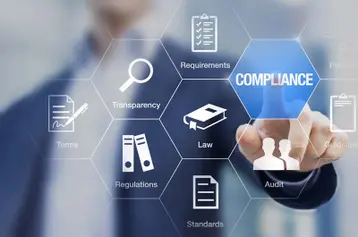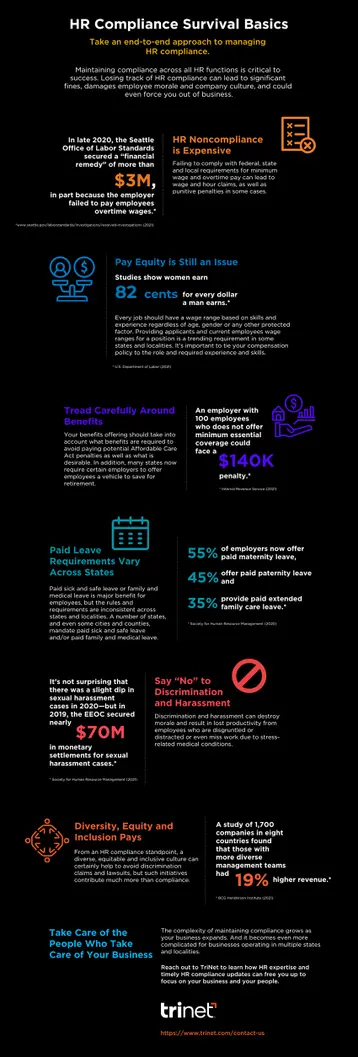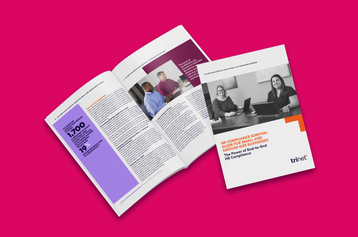8 Primary Challenges for End-to-End HR Compliance

Table of contents
- 1.Recruiting
- 2.Interviewing and Hiring
- 3.Wage and Overtime Pay
- 4.Health and Retirement Benefits
- 5.Paid Leave
- 6.Multi-State Considerations
- 7.Discrimination and Harassment
- 8.Take Care of the People Who Take Care of Your Business
Maintaining compliance across HR functions is critical to success. At the same time, it’s a tremendous challenge, especially for small and medium-size businesses (SMBs). Losing track of HR compliance can lead to significant fines, damages employee morale and company culture, and could even force you out of business.
1. Recruiting
HR compliance considerations begin as soon as you start recruiting for new hires. This is especially true as increasing numbers of companies operate across multiple states or localities, either in-person or remote.
Be aware that certain states require wage ranges or pay bands to be disclosed at varying stages of the recruitment process and under varying conditions. In addition, the Equal Employment Opportunity Commission (EEOC) prohibits language in a job posting that encourages a candidate of a particular protected class to apply or discourages another. The EEOC also prohibits recruiting in a discriminatory fashion. Many state and local laws have similar or more expansive protections against discrimination in recruiting.
2. Interviewing and Hiring
Interviewing is another area that has come under increased scrutiny. Questions should stay focused on work experience and skills with no questions about age, religion, marital status, disability or other protected classes. In addition, the “Ban the Box” movement has led many states and localities to prohibit asking an applicant about their criminal background at certain stages of the hiring process. Many states and localities also have bans on inquiring about wage history.
It’s also important to document that you interviewed a diverse pool of applicants and based your hiring decision on bona fide skills and qualifications to help protect against a discrimination lawsuit. If you require a job-related test during the interview process, it must be one that does not cause a discriminatory impact in any way. If you intend to use background checks, drug screens or other pre-employment screening, it’s best practice to conduct these screens once you’ve extended a conditional offer of employment. Some states or localities make this sequence a requirement.

3. Wage and Overtime Pay
First and foremost, the job should pay the same to anyone with similar credentials. According to the EEOC website, “The laws enforced by EEOC prohibit employers from paying employees differently based on race, color, religion, sex (including pregnancy, gender identity and sexual orientation), national origin, disability, age (40 or older) or genetic information.” Many states and localities have additional protected classes.
Although the numbers have been improving, studies show similarly qualified women on average earn 82 cents for every dollar men earn.2 There have been efforts to ensure fair wages by requiring reporting to the EEOC and certain state agencies, as well as with the pay equity and wage history ban laws at the state and local levels. Failing to comply with federal, state and local regulations for minimum wage and overtime pay can lead to wage and hour claims, as well as penalties in some cases.
In late 2020, for example, the Seattle Office of Labor Standards secured a “financial remedy” of more than $3 million, in part because it found a franchised restaurant group and individuals associated with it failed to pay employees overtime wages.1
4. Health and Retirement Benefits
Because benefits are an important factor in attracting talent, it’s always important to consider what benefits are required in addition to what is desirable to potential candidates. Since the Affordable Care Act (ACA) was enacted in 2010, certain large employers have been required to offer medical plan options to their full-time employees or potentially face a penalty for not offering compliant and affordable plans. An employer with 100 employees could face a $140,000 penalty, while an employer with 200 employees could owe $340,000.3
It’s also important to understand that there have been many changes to the ACA since it was enacted. Keeping track of the law’s changing requirements is a critical task for HR managers and one that can cost your company dearly if mismanaged.
In addition, there are many state regulations like mandatory state sponsored retirement savings programs. Many states now require employers of a certain size to offer their employees a vehicle to save dollars for retirement.
5. Paid Leave
Paid sick and safe leave or family and medical leave is another major plus for employees, but the rules and requirements are quite inconsistent across states and localities. A number of states, and even some cities and counties, mandate paid sick and safe leave, dictating the number of hours each employee can receive or accrue, sometimes according to the size of the company.
This year, 55% of employers offer paid maternity leave, 45% offer paid paternity leave and 35% provide paid extended family care leave.4 From a compliance perspective, you need to know the state or local policy for every location in which your company operates. Add to that the federal Family Medical Leave Act (FMLA), various state paid family and medical leave acts, and your own company’s paid sick/family leave policy and you have a tangle of potentially similar benefits.
6. Multi-State Considerations
Maintaining employment-related compliance becomes more complicated as your business expands. A company with 40 employees in four states or a national firm with business in all 50 states needs to know the nuances of compliance issues such as wage and hour, health care, FMLA and leaves of absence, 401(k) and HR-related training requirements for every person in every location. To complicate things, rules continually evolve as the HR compliance environment changes.
The variations in state and local requirements can be especially confounding in the case of COVID-19. Emergency leave, masking and vaccination requirements, and reporting requirements for positive cases all represent challenges to which SMBs must pay careful attention. Certain municipalities have right to recall requirements, mainly for the hospitality industry, that require previously terminated employees to be considered for rehire prior to other applicants. Some states have passed laws to protect businesses that reopen from certain COVID-19-related legal claims under varying conditions.
7. Discrimination and Harassment
Federal, state and local anti-discrimination laws are specifically aimed at preventing discrimination on the basis of applicable protected classes. Failing to follow these laws can lead to serious workplace issues and legal action; it can also significantly damage your company’s morale and reputation.
Discrimination and harassment can destroy morale and result in lost productivity from employees who are disgruntled or distracted or even miss work due to stress-related medical conditions. Given the number of people working from home, it’s not surprising that there was a slight dip in sexual harassment cases in 2020 according to the EEOC —but in 2019, the EEOC secured nearly $70 million in monetary settlements for sexual harassment cases.5 The first step to avoiding discrimination claims is understanding the most common issues and how to spot them.
Take Care of the People Who Take Care of Your Business
The complexity of maintaining HR compliance grows as your business expands. And businesses operating in multiple states need to know the nuances of compliance in every location. A full-service HR provider like TriNet provides HR consulting and timely HR compliance updates for you, freeing you up to focus on your business and your people. Offering a safe, equitable and supportive environment for your employees empowers them to accomplish extraordinary things for your business.
Reach out to TriNet to learn more about how we can help you thrive in the new business world.
- www.seattle.gov/laborstandards/investigations/resolved-investigations (2021)
- U.S. Department of Labor (2021)
- Internal Revenue Service (2021)
- Society for Human Resource Management (2020)
- Society for Human Resource Management (2021)

TriNet Team
Table of contents
- 1.Recruiting
- 2.Interviewing and Hiring
- 3.Wage and Overtime Pay
- 4.Health and Retirement Benefits
- 5.Paid Leave
- 6.Multi-State Considerations
- 7.Discrimination and Harassment
- 8.Take Care of the People Who Take Care of Your Business






